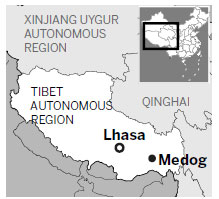Hello, World!
Updated: 2013-08-27 06:51
By Liu Xiangrui, Wang Huazhong and Daqiong (China Daily)
|
||||||||

|
Zondrui is giving the telecommunication system a thorough overhaul. The cable services have greatly benefited Medog's people. Photos by Kuang Linhua / China Daily |

A Tibetan county has come out of its long seclusion thanks to new mail and telecommunications networks. Liu Xiangrui, Wang Huazhong and Daqiong report from the Tibet autonomous region.
Editor's note: Medog county in the Tibet autonomous region is the last in China to be connected to the outside world by a paved road. Early last month, four reporters from China Daily took eight hours to drive along the 117-km Zhamog-Medog motorway, which starts high in the frigid mountains at an elevation of more than 4,300 meters. They found the road had helped reshape lives of local people, opening their minds and putting them on a fast track to development. The reporters now tell the stories of the people they interviewed during their one-week stay in the once isolated and desolate county.
Besides the new road that connects the villages of Medog to the outside world physically, developing means of communication, which bridge the two in a more subtle way, has been equally important for the lives of local people.
Growing up in Medog and dedicating himself to postal and telecommunication work for years, Zondrui, 40, is director of the county's telecommunication office.
Secluded in the mountains, Medog's education system has lagged behind the rest of China for years. Zondrui left home to study at a primary school in nearby Milin county. He attended a postal vocational school in Chengdu, Sichuan province.
For eight years after middle school, Zondrui went back home just once. He sent back only three telegraph messages because it was expensive, and the contents were almost the same.
"I only told them that 'I am good and please don't worry'," Zondrui recounts.
And his families sent him only a telegraph message. "It said: 'How have you been recently? We're concerned about you.'
"I was concerned about them, too. But I had no choice. Even a phone call was impossible then."
Telephone lines
Though telephones were already common in China's cities in the 1990s, Medog was not connected to a telephone network then.
Zondrui remembers when an old-style satellite phone was the most advanced communication tool in the county. It was a dial-out-only phone, and had no set number for itself. The phone was easily damaged as the electricity voltage in Medog was very unstable.
"If the phone broke after October, we would be unable to use it for the rest of the year," Zondrui says.
Due to bad weather in the mountains, it was impossible to send anything out for repair until the old rustic road was reopened in spring. And it might take until August to get it back.
The phone was finally "retired" in 2004, when a kind of mobile phone was introduced there.
Snail mail
There was no post office in the county town, either. In terms of letters, the usual practice was to ask a fellow villager to post them on the way to Bayi town, which was four days' walk away.
"Letters sent from outside usually went missing, so I simply didn't write them," says Zondrui.
However, letters were still an important way to communicate when Zondrui returned to work in Medog in 1997, and handling mail was part of his work until 2006. Letters to Medog used to be stored in a special office in Bayi town. Someone would only bring the backlogged letters the rest of the way when they came for other tasks or business.
"It sometimes took a year or even longer before the letters were received, and often the letters were lost in the end," Zondrui says. Due to traffic difficulties, packages were not allowed to be posted.
In August 2009, a 30-million-yuan ($4.9 million) optical-fiber cable telecommunications project, funded by the central government, revolutionized communications in Medog.
The project took four months because it was the rainy season.
"After much effort to complete some sections, they could be washed away by a flood the next day," Zondrui says.
The community is still often paralyzed by various geological hazards. In 2010, major damage to the cable required heavy maintenance, and cost more than 10 million yuan.
Internet connection
The cable has greatly benefited local people through Internet and 3G services. Banks now can complete transactions that once could take four days in seconds via the Internet.
Internet use has grown fast. There are more than 400 households with online access, compared with only 100 households in 2009. Boasting more than 80 computers, the county's two Internet bars are often packed with young people at night.
Online shopping is becoming fashionable in this once sealed-off place, too.
Sanggyi Dondrup, 22, has become an online-shopping lover since 2010, when he learnt to use the Internet. He had never seen a real computer before then.
"I can find nice-looking clothes online, and they're cheaper than those in our town," he says. It usually takes longer than half a month for the hip goods to be delivered to Medog, but he never minds it.
Sanggyi rarely has chances to go outside Medog, and he says the Internet has helped him learn about the outside world. As a member of the local dance and singing team, he would often search for related videos online to add new elements to his routines.
Now there are about 7,000 mobile phone users in the county.
According to Paima Tsomo, 26, more convenient communication allows people outside Medog to understand it better, too.
"I often use mobile-phone-based social network tools like WeChat to share Medog's unique culture and beautiful scenery with my friends and classmates," explains Paima. "Few of them had been here. They can learn more about my hometown this way."
Contact the writers through
liuxiangrui@chinadaily.com.cn.
(China Daily USA 08/27/2013 page10)

 Chinese navy starts escort mission at Gulf of Aden
Chinese navy starts escort mission at Gulf of Aden
 McGrady retires, considers career in China
McGrady retires, considers career in China
 Li Na breezes into US Open second round
Li Na breezes into US Open second round
 China and India set to resume military drills
China and India set to resume military drills
 Dwight Howard, Kai Ko promote fitness in Beijing
Dwight Howard, Kai Ko promote fitness in Beijing
 DC panda cub doing well
DC panda cub doing well
 Muslim Brotherhood leaders, Mubarak face trial
Muslim Brotherhood leaders, Mubarak face trial
 Cliff diving in the city
Cliff diving in the city
Most Viewed
Editor's Picks

|

|

|

|

|

|
Today's Top News
Nation must adjust when US tapers QE
Prosecutors seek heavy punishment for Bo Xilai
Pet abuse videos prompt outrage
China joins anti-tax fraud effort
UN to contact US over spying report
Foreigners nabbed for personal info trafficking
PLA Navy heads for routine drill in W.Pacific
Antitrust 'not target' foreign firms
US Weekly

|

|








